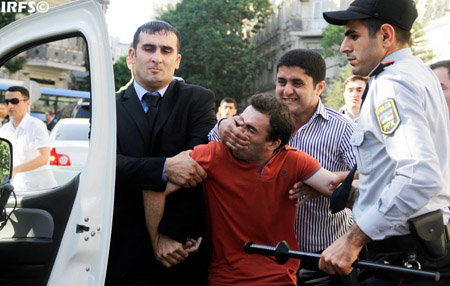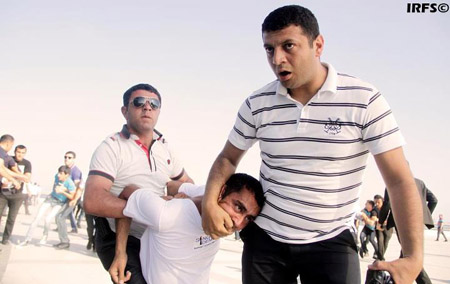This post is part of our special coverage Eurovision Azerbaijan 2012.
On the eve of the final of the Eurovision Song Contest, held this year in Azerbaijan, police in Baku, the capital, have arrested dozens of pro-democracy activists protesting against human rights violations in the oil-rich former Soviet republic. Some reports put the number of those detained at over 30 with others as high as 60-70.
Whatever the number, one thing is clear. If Eurovision has been considered as politically charged in the past, with bloc voting and regional rivalries tainting the intended good spirit of the competition, this year's event has taken controversy to new and higher levels.

Freedom of Speech in Azerbaijan! Baku 24 may 2012! Eurovision gəlsin! Photo by Mehman Huseynov
Freedom of speech in Azerbaijan. Let Eurovision come!

Baxın necə biz Eurovisiona hazırlaşdıq! Polsilərin Qadınla bü cür rəftarı! Ayıb olsun sizə! Bakı 24 may 2012 Photo by Mehman Huseynov
Look how we got ready for eurovision! This is the police's treatment of women! Shame on you!

Foto Azərbaycandaki durumu əks etdirir! Baku 25 may 2012 Photo by Mehman Huseynov
This photo reflects the situation in Azerbaijan!
@leylanajafli: who are these plainclothes?? when will this stop?? #azerbaijan brutal force used on peaceful activists http://on.fb.me/JBSCWN #eurovision
@adnanhajizada: @leylanajafli they are frm ministry of internal affairs
@sakitoglu: 60 #activists were detained today. They are still in custody. #Azerbaijan #Eurovision
@newint: #Armenia has pulled out, #HumanRights campaigners are angry… #Eurovision is as political as ever! http://ow.ly/b92lc #Azerbaijan
With the international media full of stories about Azerbaijan's human rights record, Glennmcmahon470 comments on increased attention this year.
Eurovision has long been subject to ridicule by much of western Europe with its trashy and manufactured pop considered far below our musical tastes with audiences consisting of largely excitable teenage girls and members of the gay community.
But as this year’s competition in Azerbaijan is used as a platform by human rights and pro-democracy campaigners to highlight abuses largely ignored by the western media until now, should the conscientious among us be taking it a little more seriously as a tool for change?
[…]
Previously the competition has been used by other former soviet states to promote themselves to a western Europe who barely knew they were there.
[…]
Azerbaijan is also clearly taking it very seriously, spending more than a billion dollars on the event – the most expensive contest ever, and equally hoping to put themselves on the map, bolster tourism and prove they are capable of putting on prestigious international events.
But the government clearly didn’t bargain on the attention given to its human rights record with activists getting almost as much attention as the 56-year-old event.
[…]
Whether you love it or hate it, he said, the Eurovision has at least created a dialogue on the issues facing Azerbaijan. However it remains to be seen whether once the Eurovision road-show moves on, the media circus moves with it.
@MahirZeynalov: Dear international media, please let us enjoy Eurovision. Yes, yes we get it, Azerbaijan is the worst dictatorship on Earth. Enough bashing.
@nhacizade: by now we have a pretty solid prototype of the western-publication article on #Azerbaijan and #Eurovision. thanks for never surprising.
@onewmphoto: @nhacizade True, the reports are predictable and almost overload, but let's face it. Official Baku is giving the media plenty to write about
@nhacizade: @onewmphoto yeah, not unleashing the police everytime 20 people get together for a protest walk would have saved them a lot.
@nhacizade: @onewmphoto but the nature of the coverage also comes from the fact that when media says “country you've never heard of before”..
@nhacizade: @onewmphoto what they mean is “country we never cover and dont know much about”. same for almost all post-soc states that aren't Russia.
Dubbed the ‘Eurovision Effect,’ some like AmnestyBrum, an Amnesty International group in the U.K. explains why it considers the spotlight important.
Tomorrow it’s Eurovision time and there are number of concerns we’ve got on the human right situation in the host country Azerbaijan. The song contest is a rare opportunity for Amnesty International to shine a spotlight on the country. In just the last few weeks there have been a whole series of horrific incidents.
[…]
So when everyone else is curling up to watch Eurovision there couldn’t be a better time to turn the spotlight on the real big issues in Azerbaijan. And of course there is the bitter irony that the British entry for Eurovision by Engelbert Humperdink is entitled Love Will Set You Free.
Marion Kipiani There is quite a bit of talk about how the ESC created an opening for independent journalists and HR defenders to speak to an international public. But what is your view on how to keep attention alive after world attention moves on, e.g. to Euro-2012? Do those who were brave enough to speak out now have to fear reprisals?
[…]
Khadija Ismayil […] we are going to have hot summer. Azerbaijani government will retaliate and punish those who spoiled their party. So people active in Sing for Democracy campaign will need more support further. We also expect more pressure on critical journalists and especially investigative journalists. My colleagues from RFE/RL and Bizim Yol newspapers found out how much money had been spent on ESC and that the government diverted money from water supply projects and pension increase to build a concert hall for ESC. Unfortunately, our government is tend to break mirror instead of brushing it's hair to look better.
RFE/RL's Transmission blog also reports that the organizers inside Azerbaijan have been attempting to control press conferences for the event, especially those involving one of the few contestants to show an interest in the internal human rights situation.
Following the second semifinal of the Eurovision Song Contest on May 24 in Baku, Swedish finals contestant Loreen was asked by a Reuters journalist about her meeting with Azerbaijan's political opposition.
She answered simply: “What I can say, there is two parts of me. One that is private and one that is my work that I'm doing here, and just today I want to keep the focus on this energy that we created right now.”
But Azerbaijani Public TV, which is broadcasting Eurovision, immediately had its moderator jump in to keep any more questions “relevant,” prompting howls of protest from the journalists in the room. What's more, its voiced-over translation of the reporter's question into Azeri on its domestic broadcast came through as only “How did you feel on stage?”
This post is part of our special coverage Eurovision Azerbaijan 2012.







1 comment